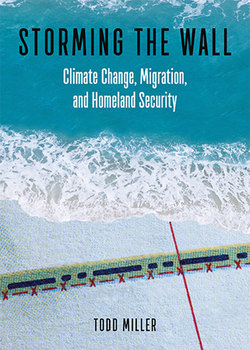Читать книгу Storming the Wall - Todd Miller - Страница 11
На сайте Литреса книга снята с продажи.
ОглавлениеTHREE
THE 21ST-CENTURY BORDER
If you ask us what’s going to happen in the near future, we have no fucking idea. Sorry for using the word “idea.”
—Subcomandante Marcos (now known as Galeano), at a press conference.
Three Honduran men sit by the train tracks in the small, broiling town of Tenosique, Mexico. They wait where hundreds of Central Americans congregate each night in hopes of jumping on the freight train notoriously known as The Beast, as it chugs north to the United States. In the distance, across the tracks, an army truck rumbles by. In the back, two soldiers stand poised with assault rifles, their faces covered with black balaclavas. The shiny Dodge Ram contrasts against the rusted machinery scattered in the overgrown grass and cement. It is as if we are on the set of a movie somewhere between Children of Men, a film that depicts the United Kingdom as an ultra-militarized police state rounding up and incarcerating refugees, and The Road, a tale of a father and son who walk across a post-apocalyptic North America devastated by an unknown cataclysm.
The Honduran men’s names are Luis Carlos, Santos Fernando, and Ismael. They have been living by the tracks in a small shack built of corrugated metal for several days. When I ask Ismael where he is from, he pulls out the identification card that is warped and fraying at the edges, as if it has been pulled out one too many times. I am not there to look for “climate refugees.” I am there to investigate Mexico’s upsurge in border policing since 2014, known as Programa Frontera Sur. The soldiers across the tracks are moving away from us. I wonder, as I watch them monitoring the train yard, if they are among the many military, police, and immigration officials who have been trained by the United States.
